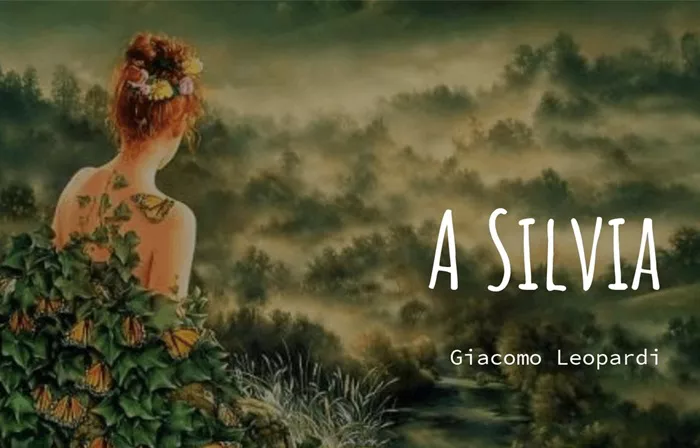Welcome to Poem of the Day – A Silvia by Giacomo Leopardi.
“A Silvia” by Giacomo Leopardi is one of the most poignant and celebrated poems in Italian literature. Written in 1828, it is both a lyrical homage to lost youth and an existential meditation on the disillusionment inherent in human life. Through this work, Leopardi gives voice to his deeply personal anguish while exploring universal themes of unfulfilled potential, fleeting beauty, and the inevitable confrontation with mortality. This essay unpacks the intricate layers of “A Silvia,” analyzing its structure, themes, and emotional resonance with a focus on the poet‘s philosophical underpinnings.
A Silvia Explanation
Historical Context and the Poem’s Creation
Leopardi composed “A Silvia” during a period of intense intellectual and emotional turmoil. Living in Recanati, a provincial town that he often described as a “prison,” Leopardi was trapped by both physical ailments and existential despair. The poem is widely believed to refer to Teresa Fattorini, the daughter of Leopardi’s household coachman, who died prematurely of tuberculosis. Though their relationship was distant, Teresa becomes a symbol of idealized youth and vitality in the poet’s imagination.
This backdrop of personal suffering and philosophical contemplation informs every line of the poem, blending Leopardi’s autobiographical experiences with his broader reflections on human destiny.
Structure and Style
“A Silvia” is written in free verse, a departure from rigid metrical forms, allowing Leopardi to convey raw emotion with fluidity. The poem unfolds in two major movements. The first part recalls Silvia’s youthful vivacity, her connection to nature, and the shared dreams of youth. The second part transitions into a lamentation, contrasting the optimism of youth with the crushing weight of disillusionment and death.
Leopardi’s language is both rich and evocative, suffused with images of springtime, song, and light—all symbols of vitality and promise. These are juxtaposed with darker motifs of silence, death, and decay. The poet employs direct apostrophe, addressing Silvia as though she were present, which heightens the immediacy of his grief and creates an intimate connection between the speaker and the reader.
Themes in “A Silvia”
The Transience of Youth: The poem is a lament for the fleeting nature of youth and beauty. Silvia, emblematic of youthful promise, becomes a tragic figure whose life is extinguished before it can blossom. Leopardi associates her with the joys of early life, such as song and the warmth of spring, only to underscore their impermanence. The line “Allor che all’opre femminili intenta / Sedevi, assai contenta / Di quel vago avvenir che in mente avevi” (When you sat, intent on feminine labors, / content with those vague dreams of the future) captures her naive hope, shattered by premature death.
Unfulfilled Potential: Silvia represents the universal condition of unrealized dreams. Leopardi projects his own aspirations and disappointments onto her, mourning not just her death but the demise of all youthful ambitions. For him, Silvia’s death symbolizes the cruel truncation of life’s possibilities, a fate that mirrors his own stunted potential due to ill health and social constraints.
Nature and Indifference: Nature, often celebrated in Romantic poetry as nurturing and harmonious, is depicted here as indifferent, even cruel. While Silvia’s youth unfolds amidst nature’s beauty, the same natural forces lead her to illness and death. Leopardi’s worldview aligns with his broader philosophical position in Zibaldone, where he argues that nature is indifferent to human suffering, existing only to perpetuate itself.
Disillusionment and the Loss of Illusions: One of Leopardi’s most pervasive themes is the loss of illusions. In “A Silvia,” the dreams of youth are juxtaposed with the harsh realities of life. The poet mourns not just Silvia, but the hope and optimism she embodied, reflecting his belief that human existence is marked by inevitable disillusionment.
Philosophical Undertones
Leopardi was deeply influenced by Enlightenment thought and skepticism, which permeates “A Silvia.” He rejects the idea of a benevolent providence, instead portraying life as governed by chance and suffering. Silvia’s untimely death becomes a metaphor for the futility of human striving. Her fate underscores the poet’s view that happiness is an illusion, a fleeting promise that nature offers only to cruelly snatch away.
Despite this bleak outlook, the poem carries a subtle trace of nostalgia. While Leopardi condemns the false hopes of youth, he also cherishes the beauty of those illusions, recognizing their role in sustaining the human spirit, however briefly.
Emotional Resonance and Universal Appeal
What makes “A Silvia” timeless is its ability to resonate across cultures and eras. The poem’s themes—youth, mortality, lost dreams—are universal, striking a chord with anyone who has grappled with the passage of time and the fragility of life. Silvia’s story, though rooted in Leopardi’s personal context, transcends it, inviting readers to reflect on their own experiences of loss and longing.
Leopardi’s masterful use of imagery, rhythm, and tone enhances the poem’s emotional impact. The progression from tender recollection to sorrowful lament mirrors the reader’s own journey through memory and grief, making “A Silvia” an enduring meditation on the human condition.
Conclusion
“A Silvia” stands as a testament to Giacomo Leopardi’s genius, encapsulating his poetic sensitivity and philosophical depth. Through the figure of Silvia, he weaves a narrative that is both intensely personal and profoundly universal. The poem’s exploration of youth, death, and disillusionment speaks to the core of human experience, reminding us of the beauty and tragedy inherent in life’s fleeting moments. Leopardi’s ability to transform personal loss into a work of enduring literary and philosophical significance ensures that “A Silvia” remains a cornerstone of Romantic poetry and a timeless reflection on the fragility of existence.

